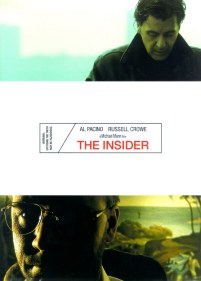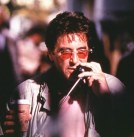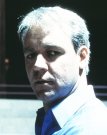The Insider
 Starring
Al Pacino, Russell Crowe, Christopher Plummer, Diane Venora, Philip Baker Hall,
Lindsay Crouse, Debi Mazar, Stephen Tobolowsky, Colm Feore, Bruce McGill, Gina
Gershon, Michael Gambon, Rip Torn, Lynne Thigpen, Hallie Kate Eisenberg.
Starring
Al Pacino, Russell Crowe, Christopher Plummer, Diane Venora, Philip Baker Hall,
Lindsay Crouse, Debi Mazar, Stephen Tobolowsky, Colm Feore, Bruce McGill, Gina
Gershon, Michael Gambon, Rip Torn, Lynne Thigpen, Hallie Kate Eisenberg.
Written by Eric Roth & Michael Mann (based on the Vanity Fair
article, "The Man Who Knew Too Much," by Marie Brenner).
Directed by Michael Mann.
Grade: A-
Review by Dana Knowles.
The Insider opens with what appears to be a man
in peril--a hostage, perhaps--blindfolded and seated in the back seat of a car
as it winds its way through the streets of Beirut. The man is Lowell Bergman
(Al Pacino), a producer for legendary CBS News Magazine 60 Minutes, but
he is not a hostage. Rather, he's being transported to a meeting with a
radical leader who wishes his location to remain unknown. The episode has
little to do with the body of the story about to be told, but it's an apt opening
image nonetheless. The Insider is about hostages, after all: men
and women held hostage to the corporate entities they're paid to serve, a family
held hostage to their fear of economic devastation and of forces more powerful
than they, and truth held hostage to the fear of men with both the will to litigate
and the unlimited resources to do so.
The hostage at the center of this tale is Jeffrey Wigand (Russell Crowe), a
former executive with the Brown & Williamson tobacco company who knows things
that would surely make waves if publicized. By an odd coincidence, he is
contacted by Bergman on an unrelated story, but soon lets slip that he's got
one of his own to tell. Unfortunately, he is precluded from doing so by
an confidentiality agreement he signed in order to receive a much-needed severance
package upon his termination. Walking a tightrope of silence strung between
duty to his family and personal honor regarding upholding the agreement he signed,
Wigand ultimately loses his balance when he is shaken off that highwire by the
aggressive and threatening tactics of his former employer. Driven as much by
rage at their hubris as by any desire to unveil the unseemly truth about Big
Tobacco, Wigand succumbs to Bergman's entreaties, eventually agreeing to go
public in an interview with Mike Wallace (Christopher Plummer). It's a
decision that will alter his life irrevocably and entrap him in ways he likely
could not have imagined. Bergman--as presented in the film, anyway--is a hostage
as well. He's the medium-big news fish caught between his obligation to Wigand
and his loyalty to his colleagues at CBS. Held captive by his own integrity,
he will ultimately breach one trust to remain true to another.
In the spirit of All the President's Men, Michael Mann (Heat, The
Last of the Mohicans) has concocted a journalistic thriller that wrings
more drama out of newsgathering than should reasonably be expected. Stunningly
shot by Dante Spinotti, the film is taut and engaging for most of its 2 1/2+
hour running time. Mann weaves various threads together into an engrossing
tapestry, staging Wigand's walk through fire as a centerpiece around which the
wheels of justice and journalism spin in fascinating detail, sometimes threatening
to derail. The middle section lags a bit by focusing too often on Wigand's
home life and his personal pain, which is an understandable (and perhaps even
admirable) concession to the tragic cost of whistleblowing, but nonetheless
robs the tale of its narrative snap on occasion. The lags are worth waiting
out, however, as they're followed by a closing act that pulls everything together
into a satisfying and captivating conclusion with regard to the many issues
being raised as well as with regard to the characters we've followed. 
For the second time in half a decade, Michael Mann has handed Al Pacino a wonderful
role to play, its breadth and depth harkening back to his glory days in the
'70s. While Wigand's stand is courageous and fraught with peril, Bergman
is clearly the other hero of the piece, ultimately taking center stage
as his own professional life begins to unravel. And though Pacino invests
him with the sort of righteousness and sincerity necessary to elicit our admiration,
he also brings a common sort of humanity to the guy, grounding him with an air
of recognizable and believable ordinariness. He's the best sort of movie
hero... a guy who could be us. (If only we were high-octane producers for
the TV news magazine equivalent of the New York Times, that is.)
Still, he's just a guy who does his job exceptionally well, only to be told
that some of his best work will never come to fruition and that his source will
be left twisting in the wind. Pacino makes the most of the role, never
stepping over the line into caricature when Bergman engages in strident rants. He
gives the character a calculated intelligence that allows him to maintain control
and a sense of humor, even when pressed to the wall. There's none of that patented
Pacino bombast on view here, and it's a welcome treat for those of us who remember
when he could routinely settle down and act, igniting the screen with
quiet intensity rather than burning it down with histrionics. 
Crowe is equally good as Wigand, a man whose external blankness only barely
masks his indignance and his sorrow as his life comes unglued before his eyes. While
the foreground circumstances fuel his immediate emotional crises, there's always
a sense of some deeper level of contemplation going on within him... as
if he's measuring his life and his choices on a grander scale, wondering how
he came to put himself in this position in the first place. Wigand is far
more interesting than you'd expect from a story like this. He's complicated
and muddled, often vacillating between positions and then leaping into the fray
on what appears to be impulse. He's not always likable, but we can still
see a decent man at his core. And there's no doubt whatsoever that he does
not deserve the anguish and the losses that he sustains in the course of the
film.
The supporting cast is full of wonderful character actors, all of whom contribute
excellent bits and pieces that add flavor and edge to the whole. Plummer mimics
Mike Wallace's vocal cadences and body language with great aplomb, pulling off
a difficult task (conjuring the essence of a very familiar man) with grace and
humor. Equally notable are Philip Baker Hall (Don Hewitt), Colm Feore,
Bruce McGill, Gina Gershon, and Michael Gambon. The two women who figure
most prominently are played by actresses I'm not particularly wild about, Diane
Venora (Wigand's wife) and Lindsay Crouse (Bergman's wife). Crouse (Places
in the Heart, House of Games) is far better here than usual, coming off
as warm and intelligent, though her scenes are few and brief. And Venora
(Bird, Heat) does adequate (if frequently overwrought) work in her role,
though I still can't count myself a fan.
Mann has always been a distinct presence behind the camera, favoring close-ups
and artfully complex shots to suck the audience into his world and keep them
on the edges of their seats. As in the magnificent Heat, he gives
us more characters and more story in The Insider than most filmmakers
would dare to foist upon the viewer, managing somehow to keep it all flowing
almost without a hitch. Even when you think you're somewhat lost, he'll
reel you back in and tie up loose ends before the lights come up, rewarding
patience and attention in satisfying ways. Ably supported by such fine
performances, Mann's visual style is riveting, making something as uneventful
as an exchange of faxes seem as gripping as a high-speed chase.
Though the surface issues at hand in <i>The Insider</i> aren't inherently
shocking (Tobacco companies lie! Nicotine is addictive! Journalists are
often compromised!), it is the subtext that provides the film with gravity.
Wigand and Bergman are heroic because they are on the side of truth regarding
important issues, but what makes them tragic and interesting is the concept
that they illustrate. In this world, it is the unusual man or woman who
dares to do the right thing and face the resistance and losses that will surely
follow. Constrained as we are by our need to feel secure, normal people do not
rock the boat, especially if we believe that there is something important at
risk. The difference between these "heroes" and those who do nothing is
that they come to value justice and integrity above their own private security
and comforts. It's this human drama at the center of the bigger story that
ultimately resonates and makes this a film worth seeing. Regardless of
one's interest in the tobacco scandal or the frailties of corporate journalism
or the terrorism inherent in misuse of our judicial system, the process by which
two men come to terms with their shared need to stand up to powers greater than
themselves is classic drama. Mann taps into that process and that need
in an exciting and compelling way, reminding us that the world is full of Goliaths
and woefully short on Davids. And subtly urging us wonder to what degree
our own choices make that our reality in the first place. The Insider
may not be groundbreaking in terms of its muckraking revelations or its cinematic
achievements, but it is an exceptionally well-crafted, well-acted drama whose
themes are as vital today as ever.
Review © November 1999 by AboutFilm.Com
and the author.
Images © 1999 Touchstone Pictures. All Rights Reserved.
 Starring
Al Pacino, Russell Crowe, Christopher Plummer, Diane Venora, Philip Baker Hall,
Lindsay Crouse, Debi Mazar, Stephen Tobolowsky, Colm Feore, Bruce McGill, Gina
Gershon, Michael Gambon, Rip Torn, Lynne Thigpen, Hallie Kate Eisenberg.
Starring
Al Pacino, Russell Crowe, Christopher Plummer, Diane Venora, Philip Baker Hall,
Lindsay Crouse, Debi Mazar, Stephen Tobolowsky, Colm Feore, Bruce McGill, Gina
Gershon, Michael Gambon, Rip Torn, Lynne Thigpen, Hallie Kate Eisenberg.

